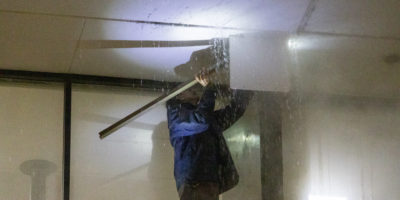By Stefanie Phillips
When Aziza Khaydrova first heard about the Ontario Public Service Employee Union (OPSEU) strike, it was through a friend at Seneca College. That was two weeks ago. Today the fourth-year nursing student received emails from the program director and campus news addressing the strike for the first time.
“I don’t know what to do in this situation,” she said.
On Oct. 10 the union representing 12,000 professors, instructors, counsellors and librarians at 24 of Ontario’s public colleges set a strike deadline for Oct. 16 at 12:01 a.m. The union is calling for faculty to have more input on academic decision-making, increased job security and an equal ratio of full-time to contract faculty.
Ryerson nursing students, like Khaydrova, had been waiting for information from the university since the strike deadline was announced. The OPSEU represents the faculty at George Brown College and Centennial College–schools that are part of the collaborative nursing program at Ryerson.
For the collaborative program, students complete the first two years of their degree at the college where they were accepted, then they finish off their third and fourth years at Ryerson. In the final two years, students pay tuition to Ryerson but still have faculty advisors from their colleges for some of their mandatory classes, including the co-op placement portion of the degree.
Khaydrova who started her degree at George Brown said she’s still concerned about the possibility of a strike.
Her biggest concern is the length of the strike and how that will affect her ability to complete the required hours at her clinical co-op placement this semester.
“If the strike is too long that means I’m only going to have a few weeks to get my placement hours.”
Billy Qian, a third-year nursing student, is also concerned about the length of the strike. One of his main projects is dependent on feedback received from his faculty advisor at Centennial College—where he started his degree. He said without that feedback it will be hard to move forward with the project.
“We don’t know how long [the strike] is going to be and if it’s going to affect us in terms of graduating with the rest of our class and everything.”
Qian said his faculty advisor told his class that the staff knew just as much as the students did and referred them all to the OPSEU website for answers to any of their questions.
Last night, a group of fourth-year students emailed five of the Ryerson nursing department heads, including Nancy Walton, the director of the Daphne Coxwell School of Nursing.
Today, those students received a response from Walton referring them to the nursing webpage for updates on the strike. The department published the webpage yesterday outlining the strike deadline.
Today they added, “Students enrolled in the Collaborative Nursing Program could be affected,” on the site. “We encourage you to check here and check your email first thing Monday morning for further details and instructions.”
Uma Devi, a fourth-year nursing student in the collaborative program said she’s glad students “finally” received information about the strike but that the information given to them wasn’t as helpful as she would like.
“The email mainly stated what we already know,” she said. “We still don’t have concrete information about any plans in place to support us.”
Dwayne Ford, the student affairs coordinator for Ryerson’s nursing school, said he does not have any specific information about the strike. He said he has been asked to refer students to the nursing webpage.
“Given what the director has said we should know something more specific by Monday,” he said.
An email sent out today to Ryerson students said only students in the collaborative nursing program will be affected.
The OPSEU published a post on their website on Oct. 10, which said the deadline was made after the College Employer Council “walked away from the bargaining table.”
“By setting a strike deadline, we are giving a clear message to the employer that we expect a fair deal for college faculty before Monday morning,” the post reads.












Paul Stephenson
Wow .This works well as they will learn about toxic unions and strikes at an early age to get more and more.That’s what nurses do as it’s about them and not caring for people.Pretty sick isn’t it.